To help aspiring personal trainers choose the best personal training certification, we’ve decided to put together a list of (mostly) objective criteria we believe trainers are most concerned with. While there really is no “best personal trainer certification,” there are different factors that may better resonate with certain people.
Personal Trainer Certifications we Analyzed: (Click below to learn more about each certification)
- ISSA – International Sports Sciences Association
- FM – Fitness Mentors
- NASM – National Academy of Sports Medicine
- ACE – The American Council on Exercise
- NCSF – National Council on Strength & Fitness
- NSCA – National Strength and Conditioning Association
- NESTA – National Exercise & Sports Trainers Association
- AFAA – Athletics and Fitness Association of America
- NFPT – National Federation of Professional Trainers
- ACSM – American College of Sports Medicine
We put together the following factors based on feedback from existing personal trainers and found as much data as possible so we could quantify our research:
- Accreditation: most gyms only accept personal training certifications that are NCCA, NBFE or DEAC – recognized so this is an important factor for aspiring trainers. These certifying bodies are considered the gold standard for fitness certifications.
- Price: includes the cost of the test and the cheapest study materials.
- Pass Rate: the total test takers divided by the passers.
- Expected Study Time: this is the time you have to take the exam from the time you purchase the study materials.
- Number of Test Questions: all tests are multiple choice, and we report on the amount of test questions for each exam. We also cover the total time allotted as well as the minimum passing score.
- CEU Requirements: amount of Continuing Education Units required to maintain certification.
- Popularity of Certification: indication of the amount of people who have a cert and take the test every year.
- Primary Focus of Education: while this topic may surprise some, each program varies slightly in what their education process concentrates on teaching you. This information is pulled straight off their catalogs.
- Average Income: average annual income by certification based on actual user feedback from reputable website Payscale.com.
- Retake Fee: if you fail the exam the first time, the price to retake the exam again.
Want to know which certification is right for you? Take our Quiz by clicking here.
Check out our infographic that covers the objective items mentioned above. Below the image is a list of all the items with a breakdown.
Below we summarize the data contained in the infographic, diving into highlights from each section, explaining why some companies vary so much, and giving an honest assessment of why each of the companies ranks where it does.
We also include a “Personal Trainer Takeaway,” from me, a longtime personal trainer who has worked in almost every facet of the business (big box gym, one-on-one, group fitness, business owner, etc.). This section is a bit more subjective, but will help you consider some things that a purely objective analysis might not.
In some instances, we were not able to find data for each of the certifying bodies and we made estimates. This estimated data is not presented in the infographic but we make mention of it here.
Let’s clear up some Personal Trainer Certification FAQs before diving in.
1: How do you get certified to be a personal trainer?
To be eligible for most certified personal trainer exams, you typically need to meet the following criteria:
- Be 18 years old
- Have a high school diploma or equivalent certification
- Have a Emergency Cardiac Care (CPR) or Automated External Defibrillator (AED) certification
These requirements may vary from certification to certification, but these are the basic guidelines for a CPT. From there, you simply register for an exam, study, pass, and begin your career.
2: How much does it cost to get certified as a personal trainer?
We cover the specifics of how much each certification body charges for the exam and study materials below, but the range is between $399 and $799.
So, you can figure it will cost you around $500 to get certified as a personal trainer for most certification bodies.
3: How long are personal training certifications good for?
The personal trainer certification length is good for life provided you keep up with continuing education requirements of your certification. Another way of explaining this is that you’ll have to understand that each personal trainer certification company has different requirements for their trainers to maintain their certifications. The general rule of thumb is a certification must be renewed every two years and is done so by taking continuing education courses. See our chart and description below to learn more about each certification.
4: What is the cheapest personal training certification?
The Fitness Mentors Personal Trainer Certification is the cheapest personal training certification at $399 including the digital textbook, 8 types of study materials, and the exam. This option is completely online and therefore does not have some of the unnecessary costs associated with the others.
5: What is the easiest personal trainer certification?
Based on the exam pass rate of 89%, Fitness Mentors boasts the highest likelihood of a student passing. This may be due in part to an at home exam and/or a higher quality of study materials, along with direct guidance from their mentors. Join their discord here to see their mentors in action.
6: How long does it take to become a personal trainer?
There are five basic ways you can become a personal trainer and each will vary in the time it takes to start the process to get your certification. You can theoretically get a personal trainer certification in as little as a few hours, but this method, available through unaccredited online companies, would be unlikely to help you get a job or equip you with any real knowledge. Furthermore, this method is not recommended by Fitness Mentors.
The other options and general timelines to get certified are:
- Self-study: Certification via Accredited US Company — 6 months +/-
- Certification via Vocational College — 30 to 42 weeks
- Certification and Degree via University Programs — 4+ years
- Certification via Gym Program (usually unaccredited training programs, not certifications) — 90 hours +/-
7: What personal trainer certificate is most respected?
The personal trainer certifications with an option for NCCA accreditation are the most respected in the industry. The NCCA is the gold standard for third-party personal training certifications. Some of these certs include, NASM, ACE, Fitness Mentors, and ISSA.
8: Is it worth it to get a personal trainer certification?
The investment in a personal trainer certification is worth it no matter which way you look at it. Most CPTs are $400 to $800 and full time trainers can expect to make this money back their first month. The education you get will also ensure a healthy knowledge for personal gains as well.
9: Do you have to be fit to be a personal trainer?
Personal trainers will be expected to be fit enough to demonstrate the exercises they are recommending to clients. While there is no fitness test to become a personal trainer, being in-shape would certainly help you attract clients.
10: What certifications do most gyms accept?
Gyms tend to accept personal trainer certifications that are NCCA Accredited (like NASM or ACE), those that are accredited by the National Board of Fitness Examiners (like Fitness Mentors or NESTA), or those with a DEAC Accreditation (like ISSA).
Accreditation
Accreditation standards are developed by several third-party credentialing organizations to maintain a level of professionalism within the fitness industry. These designations showcase that a certification body has created a high-quality program that ensures the safety and wellbeing of the public. Fitness certifications that wish to be accredited have to submit their programs and final exam to be evaluated on an individual basis. This ensures that they meet the highest standard and validates that the aspiring trainer has the competency for entry level employment.
With the exception of AFAA, every personal training certification body on this list has the option for a National Commission for Certifying Agencies (NCCA) accredited exam, which is the gold standard for fitness certifications. This is important to trainers because most gyms will only accept personal trainer certifications that are accepted by an NCCA-accredited body. So, if you are like many trainers who want to jumpstart their career by working in a gym, you may want to avoid a cert that is not NCCA-accredited.
If you are looking for a more entrepreneurial route other than working in a gym, the FM-CPT is known for having the most business emphasis in their education. AFAA is currently rebuilding their program so that they will be accredited, but their main emphasis is their group fitness certification. ISSA does have additional accreditation with Distance Education Accrediting Commission (DEAC) and National Board of Fitness Examiners (NBFE), and is accepted at most gym chains.
Personal Trainer Certifications with the option for NCCA Accreditation:
- Fitness Mentors
- NASM
- ISSA
- ACE
- NSCA
- ACSM
- NESTA
- NCSF
- NFPT
Personal Trainer Certifications with National Board of Fitness Examiners (NBFE) Affiliation
- Fitness Mentors
- ISSA
- NESTA
Personal Trainer Certification with DEAC Accreditation:
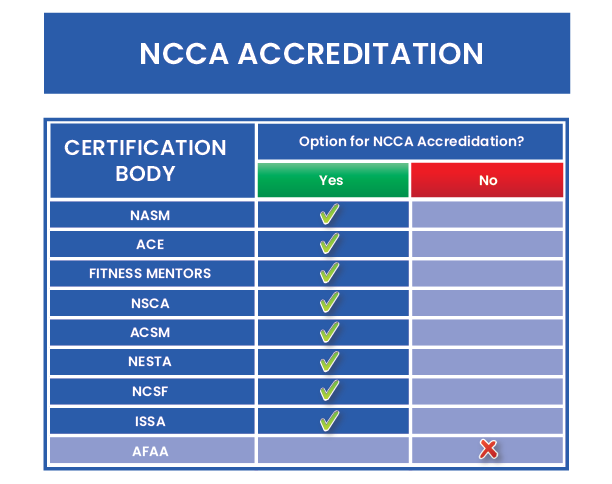
Personal Trainer Takeaway:
Be sure to check with your top employment options to find out which certifications they accept, as that may limit your certification choices. For example, if you have a friend that works at 24-Hour Fitness and says he can get you a job if you get certified, get a list of the certifications they honor so you know you’ll be a shoe-in.
Similarly, if you plan on working at a smaller shop with other personal trainers, inquire with them first if they will accept the personal training certification you are leaning towards. Bottom line, determine where you want to work, then see if those places have requirements on the types of PT certs they accept for employees.
Price
Most of the personal trainer certification bodies sit around the $500 price range for the exam and the study materials. For the least expensive yet highly reputable option, the Fitness Mentors CPT at $399 is a popular option. The only other sub-$500 option is AFAA at $499, while ACE ($509), NSCA ($587), and NASM ($674) all sit between the $500 to $600 range.
ACSM ($619), NCSF ($419), and ISSA ($828), are amongst the most expensive of the certification options.
Keep in mind that these prices fluctuate regularly and include pricing at the time of writing, factoring in current promotions.
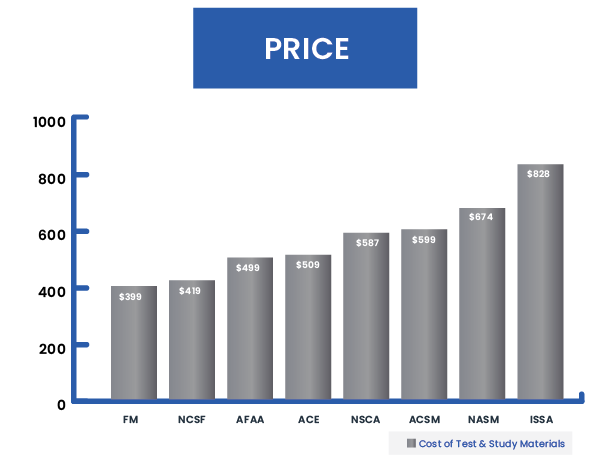
You should determine what matters most to you: prestige or cost? If you want to go with a more recognized name in the industry (NASM, ACE) it will cost more. If you only need an inexpensive, accredited certification for quick employment or for the entrepreneurial route, look toward the less expensive certifications (Fitness Mentors, AFAA).
Personal Trainer Takeaway:
You should determine what matters most to you: prestige or cost? If you want to go with a more recognized name in the industry (ISSA, NASM, ACE) it will cost more. If you only need an inexpensive, accredited certification for quick employment, look toward the less expensive certifications (Fitness Mentors, NFPT, NESTA).
However, also consider CEU requirements, income, as well as the above accreditation factors before you pull the trigger. While price may be the most important factor to you, all the factors on this page may influence your final decision beyond your initial investment.
Pass Rate
The cert with the best pass rate is Fitness Mentors at 89%, while ACSM, at 54%, sits on the bottom end.
There is no data on the Pass Rate for the AFAA because they are rebuilding everything to get NCCA accredited.
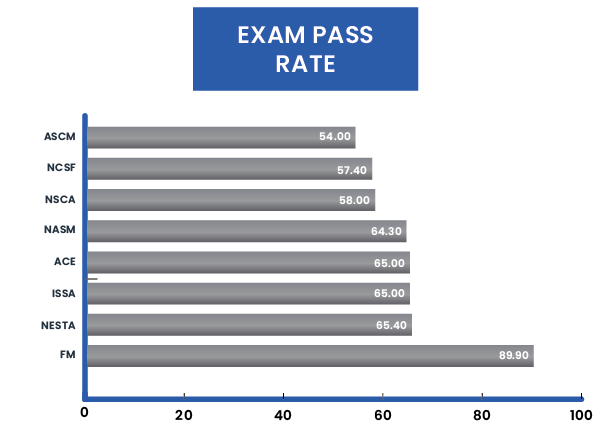
Personal Trainer Takeaway:
Some tests are much harder than others. If we use pass rate as our main reference point, it would appear that ACSM, NSCA, and NCSF have the most difficult tests. This can mean these tests are the hardest to pass or the educational experience provided is not sufficient in preparing students for the subject matter on the test.
Or, it could mean these tests tend to focus on more difficult subjects like anatomy, physiology and biomechanics. The study experience — books, study guides, practice exams, access to instructors, etc. — from fitness organizations can vary widely. The feedback from students is that some study curriculum does not fully prepare a student for a final exam as well as it could, while others find that the preparation materials provided fully prepare them for the final exam. This is why students often use third-party educators like Fitness Mentors to provide education for multiple certification exams like NASM and ACE.
Expected Study Time
The expected study time is inferred from the time the certification bodies give you when you buy the study materials until the time you have to take the exam.
Fitness Mentors: 6 Months with 80 hours of recommended study time.
NESTA: Study as long as you need but must complete the test within 90 days of requesting the exam voucher.
ACSM: 3, 6, 12, or 24 month options.
ACE: Schedule test before 6 months of purchase ends but can take it before 9 months.
ISSA: 6 months to complete.
NASM: Must complete in under 6 months.
NCSF: Must complete in under 6 months.
NCSA: 120 days after purchasing exam.
NFPT: 12 Months after purchasing exam.
AFAA: N/A
Personal Trainer Takeaway:
The timeline you have to complete the test matters depending on your situation. Are you currently unemployed and need a training job as soon as possible? You would then want the shortest study time and easiest test. Are you looking to become certified without the need for immediate employment? Maybe a longer study time would be needed since you are less motivated for immediate results. Also, keep in mind how much time you have to put toward your studies? If you only have two hours a week, you may not be able to complete your studies in the allotted time.
The main takeaway here is to not just look at the exam with the least amount of study time and say, ‘that’s for me!’ Instead, take an honest assessment of your current financial situation and the certification you really want and make the best decision for your future.
Number of Test Questions
Below: Number of test questions / total test time / minimum passing score
Fitness Mentors: 100 questions / 120 minutes / 70% or higher is passing
NASM: 120 questions / 120 minutes/ 70% or higher is passing
ACSM: 120 questions / 120 minutes / 68.75% or higher is passing. 800 points available based on scaled questions, 550 points needed to pass
AFAA: 120 questions online exam / 120 minutes / 70% or higher is passing
NFPT: 120 questions online exam / 120 minutes / 70% or higher is passing
NESTA: 125 Questions / 120 minutes / 69% or higher is passing
NCSF: 150 questions / 180 minutes / 62% or higher is passing
ACE: 150 questions / 180 minutes / 62.5% or higher is passing. 800 points available based on scaled questions 500 points needed to pass
NSCA: 155 questions / 180 minutes / 70% or higher is passing
ISSA: 160 questions / unlimited time / 75% or better is passing
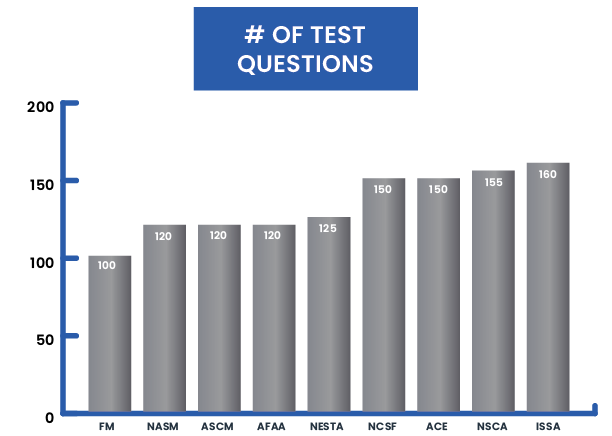
Personal Trainer Takeaway:
What type of test taker are you? A confident test taker will not need to worry about the length of test or number of questions. Someone whose mind goes blank because of testing anxiety may want to consider the shorter test like Fitness Mentors, NASM or ACSM. Or, if you have an extreme fear of tests consider Fitness Mentors or ISSA as the tests are open book. Just make sure your potential employer approves this certification.
CEU Requirement
The NCSF has by far the least amount of CEUs required at 10 credit hours. At the other end, NSCA trainers are required to obtain 60 CEUs. However, these numbers alone don’t tell the whole story, you should also consider the time periods in which these hours are required, as well as the costs to recertify.
Fitness Mentors: 20 hours of CEUs and $99 to recertify every 2 years
NCSF: 10 hours of CEUs and $50 to recertify every 2 years
AFAA: 15 Hours of CEUs and $99 to recertify every 2 years
NASM: 20 hours of CEUs and $99 to recertify every 2 years
ACE: 20 hours of CEUs and $129 to recertify every 2 years
ISSA: 20 hours of CEUs and $99 to recertify every 2 years
NESTA: 40 hours of CEUs and $149 to recertify every 4 years
ACSM: 45 hours of CEUs and $30 to recertify every 3 years
NFPT: 10 hours of CEUs and $50 to recertify every year
NSCA: 60 hours of CEUs and $50 to recertify every 3 years
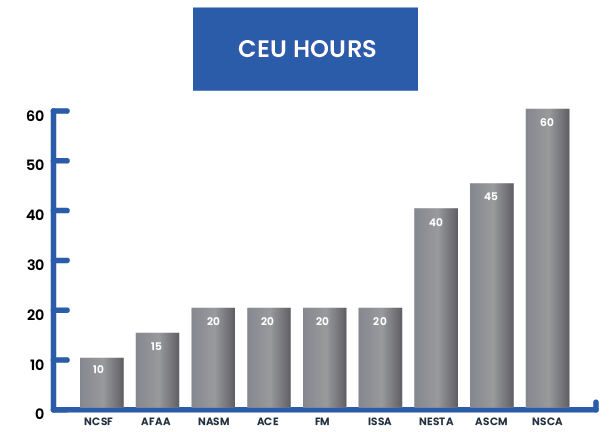
Personal Trainer Takeaway:
Recertification is required by all certifying bodies. The process of recertification varies slightly, but one common ground is that they require you to continue your education and show proof of this newly obtained knowledge via CEUs or Continuing Education Units.
Also, there are typically 1,000s of courses to choose from to continue your education and we have compiled a list of our favorites here. Another consideration is that the more CEUs that are required by a provider the more money you will spend on recertifying (roughly $20 per contact hour) which makes NSCA (60 hours) and ACSM (45 hours) less appealing financially. Hopefully, this will not matter if you are successful in your personal training career. To ensure that you are successful check out this highly recommended business and sales course for personal trainers.
Popularity of Certification
The popularity of a certification is based on the number of trainers with a specific cert in the field as well as the number of test takers per year. Not reported in the graph is the number of tests taken per year.
NASM is by far the most popular of all personal training certifications at over 22,000 attempts per year. NSCA, who is also the second-most expensive certification, has the least amount trainers with their cert. This is a bit odd considering NASM, a brand with lots of interest, can justify this interest by charging more.
AFAA said they have 350,000 certified but for a different group fitness certification. Thus, we didn’t include it on the reporting of the infographic.
The number of tests taken per year is provided below:
NASM: 22,304 attempts per year
ACE: 13,103 attempts per year
ISSA: 10,696 attempts per year
ACSM: 5,226 attempts per year
NFPT: 2,684 attempts per year
NCSF: 2,455 attempts per year
NSCA: 1,529 attempts per year
NESTA: 1,515 attempts per year
Fitness Mentors: 1037 attempts per year
Personal Trainer Takeaway:
The way that we look at this statistic is mainly by determining the recognition for each certification body. It is assumed that the more people that take a certification the more well-known that certification is. Popularity can be seen as a reputation builder meaning that more people trust that company, but it also can be determined by the volume of marketing and advertising a company puts in.
To give a brief example of this, NASM advertises on TV and radio in our local area. This leads to more people in general recognizing the NASM brand and name. When trainers say they are NASM-certified, their clients typically recognize the brand name because of the abundant advertising and that makes the trainer more reputable, even though the client knows nothing about the quality of education NASM provides.
On the other hand, some progressive companies, like Fitness Mentors, have introduced a relatively new certification. For this reason, they don’t yet have the same number of tests taken as organizations that have been around for dozens of years. The benefit of some of the newer certifications, however, is that they are able to fill voids where some of the older organizations lag. Fitness Mentors is 100% online, boasts more study materials than many of the other certifications, offers personal mentorships, and provides access to instructors. ISSA is also a 100% online option, rounding out the more progressive companies that are keeping up with modern demands of trainers who capitalize on online learning and test-taking.
The question you must ask is ‘do I care if my clients recognize the name of my certification?’ If so, choose a certification with more popularity. Just keep in mind that most clients don’t know and don’t care what certification you have, but employers do so make sure your chosen employer accepts the cert.
Primary Focus of Education
This information was taken straight off the catalogs of the certification bodies.
Fitness Mentors: Fitness Program Design and Business Success
ISSA: Fitness Program Design
NASM: Exercise Technique and Training Instruction
ACE: Behavioral Modification for Fitness Goals
NSCA: Techniques of Exercise
ACSM: Exercise Leadership and Client Education
NESTA: Business Applications
NCSF: Exercise Prescription and Programming Considerations
NFPT: Goal-oriented Program Design in User-friendly Format
Personal Trainer Takeaway:
Most of the certifying bodies will be very similar in their balance of educational topics, due to the NCCA regulation that forces companies to do a Job Task Analysis. This Job Task Analysis determines the most important knowledge to have to be successful in the field and is typically the same across the board. Therefore, each company is required to have the same topics of education.
Average Income
While the personal trainer certification bodies don’t publish this information, we are able to average data from self-reported data on reputable websites.
At the top tier of income is ISSA, NASM and ACE, at $49, 290, $41,598 and $41,546, respectively. NCSF comes in at $35,061, the lowest of incomes we were able to find data on.
For NESTA we were unable to find data but are able to estimate based on the popularity of the certification and the income reported for that cert. We estimate that these individuals, on average, make:
- NESTA: $37,531
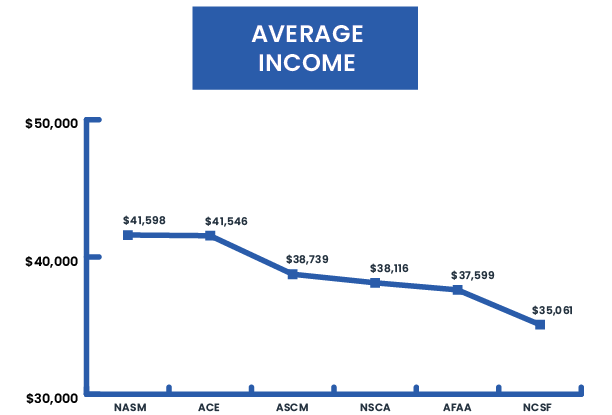
Personal Trainer Takeaway:
These incomes are averages of about 30+ different people holding the same certification working as fitness professionals. We know trainers that make $200,000 per year as well as $20,000 per year all of which have the same and/or different certifications. Your success as a business person is determined by your drive, knowledge of key business and sales techniques, location and various other things. To find out how to optimize your success we recommend this online course.
Also recently Online Personal Training has lead to a larger population of trainers making $100,000 or more. To become certified to train online and learn how to make six-figures we recommend this certification.
Retake Fee
Should you fail the exam the first time around, most certifications bodies charge to retake it. NSCA, the provider with the most expensive retake fee ($435), charges almost eight times more than the cheapest provider Fitness Mentors ($50), while the bulk of the other providers are in the $100 to $200 range. UPDATE: ISSA does offer a free retest with their packages.
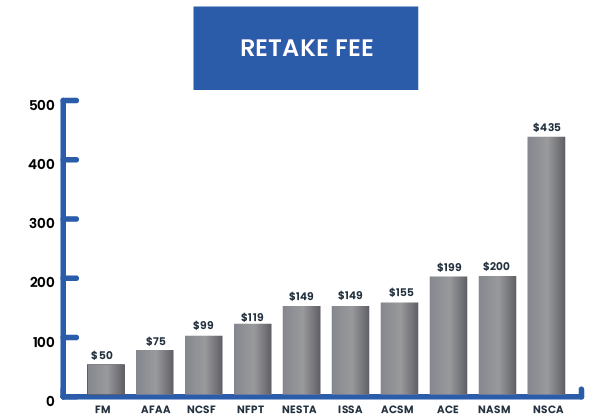
Personal Trainer Takeaway:
The takeaway here is to prepare for whatever test you take, and make sure you pass the first time around!
Who to Pick for the Best Personal Training Certification
Again, choosing a personal training certification is a very subjective decision and certain factors may weigh more heavily with specific individuals. For example, if price is a factor, then NASM may not be the best option for you. However, when you look at income, ISSA and NASM personal trainers tend to make the most, showing that this is likely the best investment in your future.
If you are a terrible test taker, the Fitness Mentors CPT exam may be appealing to you as it is open book and has a nearly 80% pass rate.
The amount of CEUs required, as well as the recertification fee, are also an important consideration as this is required by all the certification bodies.
The point is you should be objective in your selection and determine what factors are most important to you. Talk to some other trainers and ask them what cert they have, if they like it, and if they’d recommend it to you. But remember, any trainer you ask advice for will likely be partial to whatever certification they have.
If you are interested in two personal training certifications for the cost of one, the NFPT and Fitness Mentors have partnered to provide the best education experience in the industry with the power of earning two CPT Certifications at once.
The Fitness Mentors CPT Certification is also recommended by Personal Trainer Pioneer, one of the best review sites for personal training certifications. Learn more about their recommended packages here.
I hope that this post has helped you make the decision to choosing the best personal training certification for you that much easier. If you have any questions, or would like to see anything else added to this list, please contact us today.



